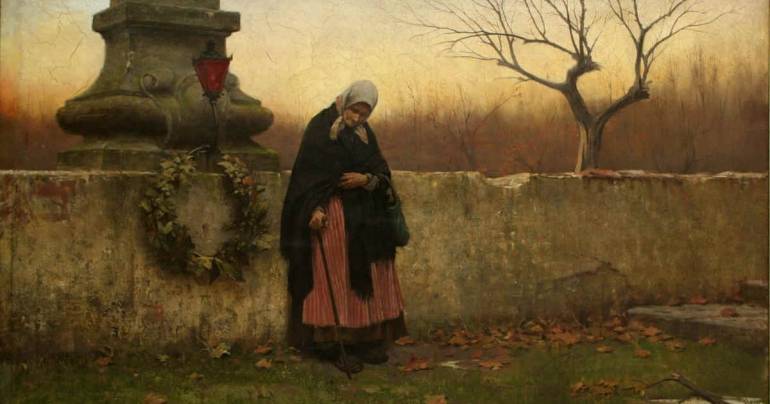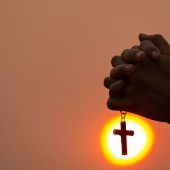The Holy Souls in Purgatory

The following excerpt is from Chapter 8 of My Catholic Faith!:
As we celebrate the Commemoration of All Souls, let’s reflect upon our Church teaching on Purgatory:
The Church Suffering: Purgatory is an often misunderstood doctrine of our Church. What is Purgatory? Is it the place we have to go to be punished for our sins? Is it God’s way of getting us back for the wrong we’ve done? Is it the result of God’s anger? None of these questions really answer the question of Purgatory. Purgatory is nothing other than the burning and purifying love of our God in our lives!
When someone dies in God’s grace they are most likely not 100% converted and perfect in every way. Even the greatest of saints most often would have some imperfection left in their lives. Purgatory is nothing other than that final purification of all remaining attachment to sin in our lives. By analogy, imagine that you had a cup of 100% pure water, pure H2O. This cup will represent Heaven. Now imagine that you want to add to that cup of water but all you have is water that is 99% pure. This will represent the holy person who dies with just some slight attachments to sin. If you add that water to your cup then the cup will now have at least some impurities in the water as it mixes together. The problem is that Heaven (the original cup of 100% H2O) cannot contain any impurities. Heaven, in this case, cannot have even the slightest attachment to sin in it. Therefore, if this new water (the 99% pure water) is to be added to the cup it must first be purified even of that last 1% of impurities (attachments to sin). This is ideally done while we are on Earth. This is the process of getting holy. But if we die with any attachment, then we simply say that the process of entering into the final and full vision of God in Heaven will purify us of any remaining attachment to sin. All may already be forgiven, but we may not have detached from those things forgiven. Purgatory is the process, after death, of burning out the last of our attachments so that we can enter Heaven 100% freed of everything to do with sin. If, for example, we still have a bad habit of being rude, or sarcastic, even those tendencies and habits must be purged.
How does this happen? We do not know. We only know it does. But we also know it’s the result of God’s infinite love that frees us of these attachments. Is it painful? Most likely. But it’s painful in the sense that letting go of any disordered attachment is painful. It’s hard to break a bad habit. It’s even painful in the process. But the end result of true freedom is worth any pain we may have experienced. So, yes, Purgatory is painful. But it’s a sort of sweet pain that we need and it produces the end result of a person 100% in union with God.
Now since we are talking about the Communion of Saints, we also want to make sure to understand that those going through this final purification are still in communion with God, with those members of the Church on Earth, and with those in Heaven. For example, we are called to pray for those in Purgatory. Our prayers are effective. God uses those prayers, which are acts of our love, as instruments of His grace of purification. He allows us and invites us to participate in their final purification by our prayers and sacrifices. This forges a bond of union with them. And no doubt the saints in Heaven especially offer prayers for those in this final purification as they await full communion with them in Heaven. It’s a glorious thought and a joy to see how God has orchestrated this entire process for the ultimate purpose of the holy communion to which we are called!
Lord, I pray for those souls going through their final purification in Purgatory. Please pour forth Your mercy upon them so that they may be freed of all attachment to sin and, thus, be prepared to see You face to face. Jesus, I trust in You.
Radio Veritas Asia (RVA), a media platform of the Catholic Church, aims to share Christ. RVA started in 1969 as a continental Catholic radio station to serve Asian countries in their respective local language, thus earning the tag “the Voice of Asian Christianity.” Responding to the emerging context, RVA embraced media platforms to connect with the global Asian audience via its 21 language websites and various social media platforms.














